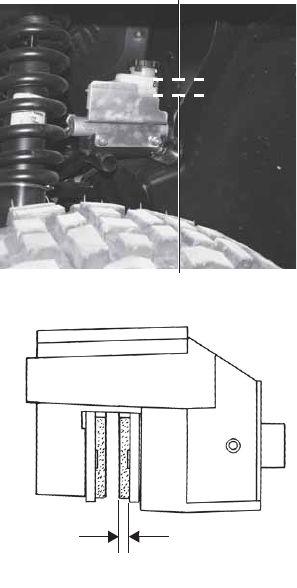
96
MAINTENANCE
Brakes
The front and rear brakes are hydraulic disc type brakes activated by the brake pedal. See
page 24.
Brake Fluid
Inspect the brake system routinely. Inspect the level of the brake fluid before each operation.
WARNING! After opening a bottle of brake fluid, always discard any unused portion. Never store or
use a partial bottle. Brake fluid is hygroscopic, meaning it rapidly absorbs moisture from the air. The
moisture causes the boiling temperature of the brake fluid to drop, which can lead to early brake fade
and the possibility of accident or severe injury.
Change the brake fluid every two years and any time the fluid becomes contaminated, the
fluid level is below the minimum, or if the type and brand of the fluid in the reservoir are
unknown.
1. Position the vehicle on a level surface.
2. View the brake fluid level at the reservoir in the
driver’s side wheel well.
3. The level should be between the upper (MAX) and
lower (MIN) level lines.
4. If the fluid level is lower than the upper level line,
add brake fluid to the upper (MAX) line.
5. Apply the brake forcefully for a few seconds and
check for fluid leakage around the fittings.
Brake Inspection
1. Check the brake system for fluid leaks.
2. Check the brake pedal for excessive travel or a
spongy feel.
3. Check the friction pads for wear, damage and
looseness.
4. Check brake discs for signs of cracks, excessive
corrosion, warping or other damage. Clean any
grease using an approved brake cleaner or alcohol.
NOTICE: Do not apply WD-40 or any petroleum product to
brake discs.
5. Inspect the brake disc spline and pad wear surface
for excessive wear. Change pads when worn to 3/64” (1 mm).
Maximum
Minimum
3/64" (1mm)


















